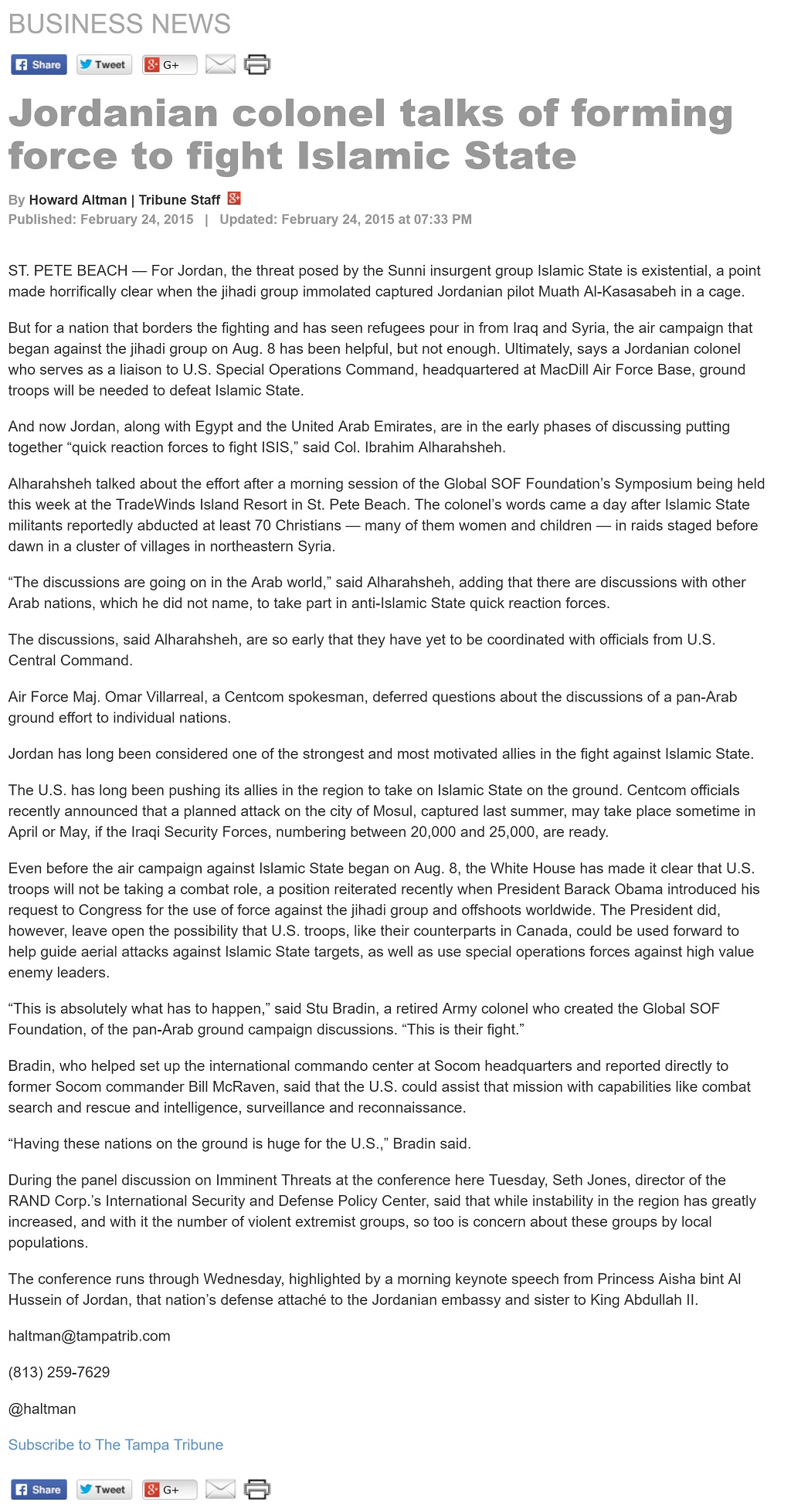
ST. PETE BEACH — For Jordan, the threat posed by the Sunni insurgent group Islamic State is existential, a point made horrifically clear when the jihadi group immolated captured Jordanian pilot Muath Al-Kasasabeh in a cage.
But for a nation that borders the fighting and has seen refugees pour in from Iraq and Syria, the air campaign that began against the jihadi group on Aug. 8 has been helpful, but not enough. Ultimately, says a Jordanian colonel who serves as a liaison to U.S. Special Operations Command, headquartered at MacDill Air Force Base, ground troops will be needed to defeat Islamic State.
And now Jordan, along with Egypt and the United Arab Emirates, are in the early phases of discussing putting together “quick reaction forces to fight ISIS,” said Col. Ibrahim Alharahsheh.
Alharahsheh talked about the effort after a morning session of the Global SOF Foundation’s Symposium being held this week at the TradeWinds Island Resort in St. Pete Beach. The colonel’s words came a day after Islamic State militants reportedly abducted at least 70 Christians — many of them women and children — in raids staged before dawn in a cluster of villages in northeastern Syria.
“The discussions are going on in the Arab world,” said Alharahsheh, adding that there are discussions with other Arab nations, which he did not name, to take part in anti-Islamic State quick reaction forces.
The discussions, said Alharahsheh, are so early that they have yet to be coordinated with officials from U.S. Central Command.
Air Force Maj. Omar Villarreal, a Centcom spokesman, deferred questions about the discussions of a pan-Arab ground effort to individual nations.
Jordan has long been considered one of the strongest and most motivated allies in the fight against Islamic State.
The U.S. has long been pushing its allies in the region to take on Islamic State on the ground. Centcom officials recently announced that a planned attack on the city of Mosul, captured last summer, may take place sometime in April or May, if the Iraqi Security Forces, numbering between 20,000 and 25,000, are ready.
Even before the air campaign against Islamic State began on Aug. 8, the White House has made it clear that U.S. troops will not be taking a combat role, a position reiterated recently when President Barack Obama introduced his request to Congress for the use of force against the jihadi group and offshoots worldwide. The President did, however, leave open the possibility that U.S. troops, like their counterparts in Canada, could be used forward to help guide aerial attacks against Islamic State targets, as well as use special operations forces against high value enemy leaders.
“This is absolutely what has to happen,” said Stu Bradin, a retired Army colonel who created the Global SOF Foundation, of the pan-Arab ground campaign discussions. “This is their fight.”
Bradin, who helped set up the international commando center at Socom headquarters and reported directly to former Socom commander Bill McRaven, said that the U.S. could assist that mission with capabilities like combat search and rescue and intelligence, surveillance and reconnaissance.
“Having these nations on the ground is huge for the U.S.,” Bradin said.
During the panel discussion on Imminent Threats at the conference here Tuesday, Seth Jones, director of the RAND Corp.’s International Security and Defense Policy Center, said that while instability in the region has greatly increased, and with it the number of violent extremist groups, so too is concern about these groups by local populations.
The conference runs through Wednesday, highlighted by a morning keynote speech from Princess Aisha bint Al Hussein of Jordan, that nation’s defense attaché to the Jordanian embassy and sister to King Abdullah II.
